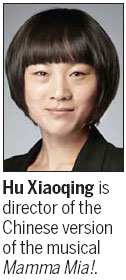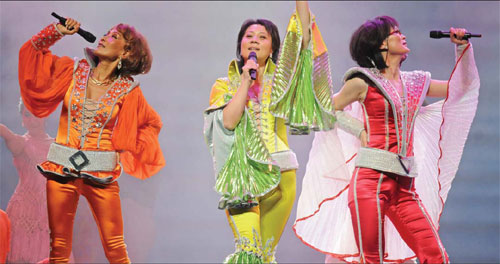Here we go again!
Updated: 2012-06-29 12:51
By Li Aoxue (China Daily)
|
|||||||||||
|
The Chinese version of the musical Mamma Mia! will be staged in cities such as Tianjin, Nanjing and Hangzhou in August, after 200 performances last year. Provided to China Daily |

Chinese mamma mia! Director lends serious note to encore of hit musical
Mamma Mia! My, my, how can you resist it? After 13 years of playing to 42 million people around the world, the answer appears to be - we can't.
Mandarin was the 14th language in which the hit musical based on the songs of Swedish band ABBA was performed, when it toured China in summer last year. Although audiences had taken to other shows performed by international touring groups, this was the first Chinese production of a Western-style musical.
In response to another line in the title song, "Does it show again, just how much I've missed you?" the show is returning in August for another tour - this time to second-tier cities such as Tianjin, Nanjing, Hangzhou and Taiyuan, that missed out on the 200 performances of 2011.
There will be changes to the all-Chinese cast and maybe some updating of local references in the script, but otherwise it will be essentially the same show that has wowed audiences since it opened on London's West End in April 1999.
One major factor that will remain the same for the Chinese production of Mamma Mia!, however, is its young female director.
Hu Xiaoqing has paved the way for more Chinese productions of Western musical theater. Other classics of the tradition are set to follow in the near future, including The Sound of Music, The Phantom of the Opera, and Oliver. A Chinese version of Cats is due to open in Shanghai, also in August.
"The Chinese production of Mamma Mia! did help to make musicals very popular in China," Hu says.
There were worries that the plot of the show, set around a holiday wedding on a Greek island, might not have been appreciated as much by Chinese audiences due to cultural differences, but these were quickly dispelled.
"Chinese audiences can accept it now as they are not as narrow-minded as before, plus the music was very familiar to them," Hu says.
Hu's Mamma Mia! was also groundbreaking in that it gave a lead to other Chinese theatrical directors and producers, as well as actors and musicians.
"The Chinese production of a foreign musical provided an opportunity for Chinese directors to learn, and to create their own musical productions," Hu adds.
The big theaters, necessary for staging these large and lavish shows, only began appearing in the 1980s, and only in major cities such as Beijing and Shanghai. With the recent boom in the Chinese economy, massive multi-purpose facilities have sprung up in many second-tier cities, including Wuhan in central Hubei province, where Mamma Mia! played last year.
Many of these provincial theaters are working on producing their own modern musicals to run alongside centuries-old traditional Chinese opera in the repertoire.
"Compared with the development of foreign theater, Chinese theater is not mature in terms of script production and stage management," Hu says. "In the US, it can take six to seven years to turn out a good play, but in China it sometimes only takes several months."
But unlike many other ambitious enterprises in modern China at present, Hu is not concerned with the "Money, Money, Money" side of things. The 30-year-old director believes other things are more important.
"Although the Chinese government has been advocating development of China's soft power in recent years and a lot of people have started to pay attention to the theater market, thinking of it as a new niche to make profits, plays should be created according to the artist's conscience, to arouse people's realization about the things that are being neglected in society," says Hu, who trained as a theater director in the United States for five years.
Born in Shanghai in 1982, Hu grew up with a love of dancing and singing, and took part in productions at school and university.
After graduating from Peking University in 2004, Hu began working behind the scenes at the Arkansas Repertory Theatre. But she quickly picked up experience at the helm, and by 2009, she had directed one musical and five plays. She was offered a job as assistant artistic director, but turned it down to return to China instead.
"I found what I needed wasn't a job. I wanted to become a director because I wanted my work to arouse people's awareness, and hopefully make society a better place - for my people."
Since returning to China, she has directed five plays, all of which she says reflect the spirit of human nature.
"I want my plays to deliver an inspirational message to my audience as I believe the function of theater is not only to entertain," she says.
One of the plays, Into the Numbers by Christopher Chen, is her favorite work. It is based on Iris Chang's book The Rape of Nanking, the first English-language account of the massacre that took place during the War of Resistance against Japanese Aggression (1937-45).
"The reason I chose this play is because it is strong and full of power, and I wanted it to make an impression on the audience and deliver a message to them. And topics such as the Nanjing massacre should never be forgotten," Hu says.
It all sounds very serious in contrast to the fun and frolics of Mamma Mia! But entertainment is a serious business.
"Being a director is not easy," Hu says. "Sometimes you feel you need to have a lot more life experience to be able to direct a play properly, but you just have to get on and do it, be down-to-earth about it, and one day, you find you've got enough experience and can direct them well."
The skills of the director are not only confined to the stage. She notes that in Western countries, company executives will employ directors to teach them, or their employees, how to express and present themselves better in business situations.
At university, Hu worked in several Shakespeare plays directed by Joseph Graves, a former Broadway actor.
"He was the first person who taught me how a role should be played and that being a director is not that mysterious," Hu says. "A good director does not need to use flowery speech while directing performers. You just need to ask them 'who are you and what do you want to do?'"
These are questions that Hu resolutely answered for herself many years ago.
liaoxue@chinadaily.com.cn
(China Daily 06/29/2012 page20)
Today's Top News
Rescuers race against time for quake victims
Telecom workers restore links
Coal mine blast kills 18 in Jilin
Intl scholarship puts China on the map
More bird flu patients discharged
Gold loses sheen, but still a safe bet
US 'turns blind eye to human rights'
Telecom workers restore links
Hot Topics
Lunar probe , China growth forecasts, Emission rules get tougher, China seen through 'colored lens', International board,
Editor's Picks

|

|

|

|

|

|






